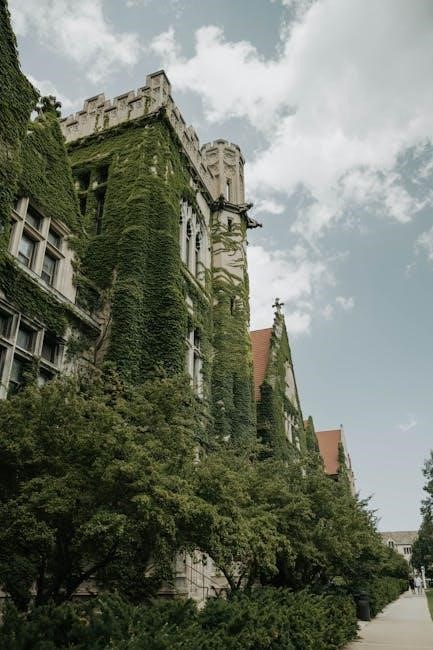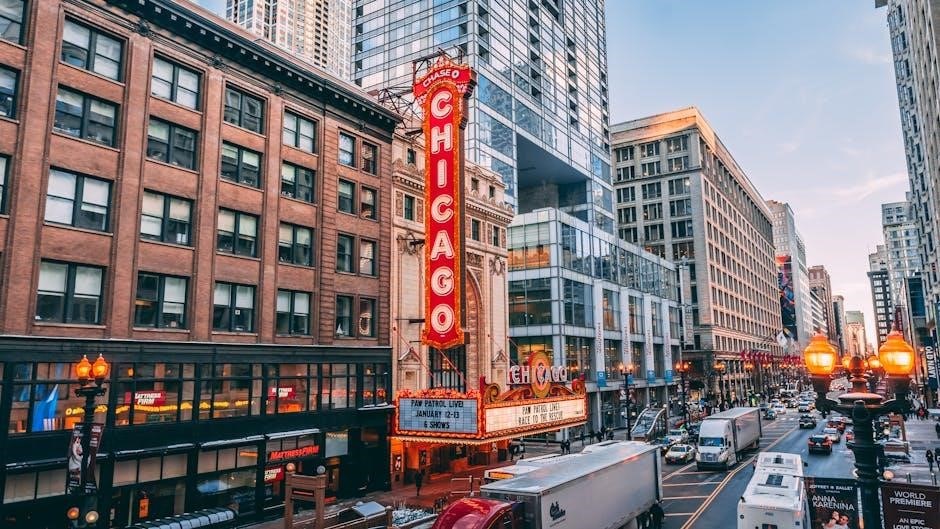
Swami Vivekananda‚ born Narendranath Datta‚ was a 19th-century Indian philosopher and monk who played a pivotal role in modern Hinduism and Vedanta Philosophy. He introduced yoga and Vedanta to the West‚ influencing spiritual thought globally.
1.1. Early Life and Spiritual Journey
Swami Vivekananda‚ born Narendranath Datta in Kolkata in 1863‚ was raised in a culturally rich family. His early education and spiritual curiosity led him to explore Hindu scriptures. He met Ramakrishna Paramahamsa‚ a mystic‚ whose teachings profoundly influenced him. After Ramakrishna’s death‚ Vivekananda embarked on a spiritual journey across India‚ adopting the life of a wandering monk. His experiences shaped his philosophy and prepared him for his historic role at the 1893 Chicago Parliament of Religions.
1.2. Role in Modern Hinduism and Vedanta Philosophy
Swami Vivekananda played a pivotal role in reviving and modernizing Hinduism‚ emphasizing Vedanta philosophy’s universal principles. He introduced yoga and Vedanta to the West‚ making them accessible globally. His teachings highlighted the unity of all religions and the importance of spiritual tolerance. Vivekananda’s interpretation of Vedanta emphasized practical application‚ inspiring millions. He also established the Ramakrishna Mission‚ spreading his teachings worldwide. His work laid the foundation for modern Hindu thought and interfaith dialogue‚ fostering a deeper understanding of India’s spiritual heritage.

Historical Context of the Chicago Lecture
The Chicago lecture occurred at the 1893 World’s Parliament of Religions‚ a historic gathering of global religious leaders. This event marked a turning point for Swami Vivekananda.
2.1. The World’s Parliament of Religions in Chicago (1893)
The World’s Parliament of Religions‚ held in Chicago in 1893‚ was a historic event aimed at fostering global religious harmony. It was part of the World’s Columbian Exposition‚ attracting leaders from diverse faiths. Swami Vivekananda’s participation marked the first time Hinduism was represented on such a global stage. His speech on September 11‚ 1893‚ electrified the audience‚ introducing Vedanta and Indian spirituality to the West. This event not only elevated Vivekananda’s stature but also exposed the world to India’s rich spiritual heritage.
2.2. Global Religious Dialogue and Its Significance
The World’s Parliament of Religions in Chicago marked a milestone in global religious dialogue‚ fostering mutual understanding and respect. Swami Vivekananda’s speech emphasized unity and harmony among diverse faiths‚ challenging stereotypes about Eastern spirituality. His message resonated worldwide‚ bridging cultural divides and promoting interfaith cooperation. This event underscored the importance of religious dialogue in a globalized world‚ inspiring future generations to embrace diversity and seek common ground. It remains a cornerstone of modern interfaith movements‚ reflecting the power of shared spiritual values.

Key Themes of the Chicago Speech
Swami Vivekananda’s speech focused on unity‚ harmony‚ and the universal acceptance of all religions. He emphasized the concept of a universal religion and India’s spiritual leadership.
3.1. Universal Acceptance and Respect for All Religions
Swami Vivekananda’s speech emphasized the importance of accepting and respecting all religions as true and sacred. He advocated for unity and harmony among diverse faiths‚ declaring that no religion is superior. His message promoted tolerance and understanding‚ encouraging people to recognize the common goal of all religions: reaching the divine. This universal acceptance was a cornerstone of his philosophy‚ fostering global harmony and interfaith dialogue. His words resonated deeply‚ inspiring a shift in perceptions and paving the way for a more inclusive spiritual landscape.
3.2. The Concept of Universal Religion
Swami Vivekananda introduced the idea of a universal religion‚ emphasizing the unity underlying all faiths. He envisioned a framework where diverse religious traditions could coexist harmoniously‚ recognizing their shared goal of spiritual enlightenment. This concept transcended sectarian differences‚ advocating for a broader understanding of spirituality. Vivekananda believed that truth is one‚ though expressed in many forms‚ and urged humanity to embrace this oneness. His vision of universal religion aimed to foster global unity and mutual respect‚ resonating deeply with his audience and beyond.
3.3. The Role of India in Spiritual Leadership
Swami Vivekananda highlighted India’s role as a spiritual leader‚ emphasizing its ancient wisdom and contributions to global harmony. He showcased India as a land of tolerance‚ where diverse faiths coexisted peacefully. Vivekananda believed India could guide humanity toward spiritual enlightenment‚ advocating for the nation’s unique position in fostering universal peace. His speech underscored India’s potential to inspire the world through its rich spiritual heritage‚ positioning it as a beacon of hope for global unity and religious understanding.

The Impact of the Lecture
The Chicago lecture established India as a spiritual leader‚ inspiring global recognition and fostering interfaith dialogue. It remains a cornerstone of modern Hinduism and universal spirituality.
4.1. Immediate Reaction and Applause at the Parliament
Swami Vivekananda’s speech received an overwhelming standing ovation‚ with thunderous applause lasting minutes. His opening address‚ “Sisters and Brothers of America‚” captivated the audience‚ showcasing India’s spiritual richness. The heartfelt response reflected the emotional connection his words created‚ marking a historic moment. This immediate acclaim not only highlighted his oratory brilliance but also set the tone for his subsequent speeches‚ solidifying his presence at the Parliament and beyond.
4.2. Global Recognition and Fame for Swami Vivekananda
Swami Vivekananda’s Chicago lecture catapulted him to global fame‚ introducing Indian spirituality to the West. His teachings on yoga‚ Vedanta‚ and universal acceptance resonated worldwide‚ establishing him as a key figure in modern spirituality. The lecture marked the beginning of his international influence‚ inspiring countless followers and shaping global perceptions of Hinduism. His message of unity and respect for all religions continues to inspire‚ cementing his legacy as a spiritual leader whose ideas transcend time and borders.
Legacy of the Chicago Speech
Swami Vivekananda’s Chicago speech laid the foundation for modern interfaith dialogue‚ inspiring the establishment of the Ramakrishna Mission and shaping India’s spiritual identity globally.
5.1. Influence on Modern Hinduism and Interfaith Dialogue
Swami Vivekananda’s Chicago speech revitalized Hinduism‚ emphasizing its universal appeal and fostering interfaith dialogue. His teachings promoted religious harmony‚ inspiring a global movement toward spiritual unity. By presenting Vedanta as a universal philosophy‚ he bridged Eastern and Western thought‚ shaping modern Hinduism’s inclusive identity. His ideas continue to influence interfaith discussions‚ encouraging mutual respect and understanding among diverse religious traditions. The speech remains a cornerstone of Hinduism’s resurgence and its role in global spiritual exchange‚ ensuring Vivekananda’s legacy endures as a pioneer of interfaith harmony.
5.2. Establishment of the Ramakrishna Mission
The Chicago lecture inspired the founding of the Ramakrishna Mission in 1897‚ dedicated to serving humanity through education‚ healthcare‚ and social service. Headquartered in Belur Math‚ the mission promotes Vedanta philosophy globally‚ fostering spiritual growth and selfless work. Vivekananda’s vision of universal religion and service to mankind laid the foundation for this organization‚ which continues to inspire millions worldwide. The mission’s establishment was a direct outcome of his teachings‚ emphasizing practical spirituality and the upliftment of society.
Accessing the Chicago Lecture PDF
The Chicago lecture PDF is easily accessible via sources like Google Books‚ Archive.org‚ and the Ramakrishna Mission website. It’s available in PDF and text formats for free download‚ allowing global readers to explore Vivekananda’s historic speech conveniently.
6.1. Sources for Downloading the PDF
The Chicago lecture PDF is available on platforms like Google Books‚ Archive.org‚ and the official Ramakrishna Mission website. Additionally‚ it can be downloaded from academic databases and reputable e-book repositories. Ensure to verify the authenticity of the source for an accurate version of the speech. These platforms offer free access‚ making it convenient for readers worldwide to explore Vivekananda’s historic address in a reliable digital format.
6.2. Key Points to Focus on While Reading the PDF
While reading the PDF of Swami Vivekananda’s Chicago lecture‚ focus on his emphasis on universal acceptance and respect for all religions. Note his vision of a universal religion that transcends boundaries. Pay attention to his portrayal of India as a spiritual leader and the harmony he advocates between Eastern and Western philosophies. Observe how he blends ancient Vedantic principles with modern ideas of tolerance and unity. These themes highlight the timeless relevance of his message‚ inspiring readers to embrace diversity and spiritual inclusivity.

Cultural and Historical Significance
Swami Vivekananda’s Chicago lecture marked a turning point in Indian history‚ elevating India’s spiritual image globally and fostering cultural pride. It remains a symbol of unity and inspiration.
7.1. The Speech as a Turning Point in Indian History
Swami Vivekananda’s Chicago lecture was a historic milestone‚ reshaping global perceptions of India and its spirituality. It ignited national pride‚ challenging stereotypes and showcasing India’s rich philosophical heritage. His address not only elevated India’s stature internationally but also inspired a cultural and spiritual reawakening. It marked a shift in how the world viewed Indian thought‚ emphasizing unity and universal acceptance. This speech became a beacon for future generations‚ symbolizing India’s potential to lead in spiritual and intellectual realms‚ forever etching its significance in history.
7.2. Its Role in Shaping Global Perceptions of India
Swami Vivekananda’s Chicago lecture profoundly influenced global perceptions of India‚ presenting it as a land of spiritual wisdom and intellectual richness. His speech challenged Western stereotypes‚ introducing Vedanta and yoga to the world. It highlighted India’s contributions to universal spirituality‚ fostering respect and curiosity. The lecture shifted the narrative from colonial perceptions to one of admiration‚ positioning India as a global spiritual leader. This transformational impact continues to shape international views‚ cementing India’s reputation as a source of timeless wisdom and inspiration.
Modern Relevance of the Lecture
Swami Vivekananda’s Chicago lecture remains relevant today‚ advocating universal acceptance and spiritual harmony. His teachings inspire global interfaith dialogue and personal growth‚ resonating across generations and cultures.
8.1. Application of Vivekananda’s Teachings in Contemporary Times
Swami Vivekananda’s teachings from the Chicago lecture continue to inspire modern spirituality and interfaith dialogue. His emphasis on universal acceptance fosters global harmony‚ while his principles of self-realization and service guide personal growth. In today’s diverse world‚ his ideas promote mindfulness‚ tolerance‚ and the pursuit of inner peace‚ making them highly relevant. His vision of a unified humanity resonates strongly‚ offering solutions to contemporary challenges like cultural divisions and mental stress‚ ensuring his legacy remains a powerful force for positive change.
8.2. Inspiring Future Generations with His Vision
Swami Vivekananda’s vision continues to inspire future generations‚ emphasizing self-reliance‚ universal acceptance‚ and spiritual growth. His teachings encourage youth to embrace their potential‚ fostering leadership and service. The ideals of harmony and unity he presented in Chicago resonate deeply‚ motivating young minds to pursue a world of compassion and understanding. His legacy institutions‚ like the Ramakrishna Mission‚ nurture these values‚ ensuring his message endures. Today‚ his words remain a beacon‚ guiding young leaders to create a more inclusive and enlightened global community.